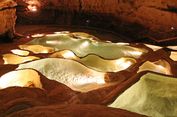Hydrogen Still in The Eco-Car Race
Hart said the glass capillaries appear to be an "interesting" technology that would be "very significant" if it were to provide the energy claimed by the company. But if it means creating a new refueling infrastructure, "it may still not be the right answer for cars," he said.
Like electric cars, the driving force behind hydrogen research is the need to break away from oil and rein in emissions of greenhouse gases blamed for climate change, especially carbon dioxide from industry and transport. Transportation adds about 13 percent of manmade carbon to the atmosphere.
Hydrogen boasts zero emissions. It can be produced from water through electrolysis, or harvested as the waste product of nuclear reactors and chemical plants.
"In terms of saving carbon dioxide, you do a great deal more with renewable hydrogen," said Danny Dicks, a biofuels expert from the British consultancy group Innovation Observatory. "So ultimately, hydrogen is where things ought to be driving toward."
Automakers, for now, still are focused on battery power. At the Geneva Motor Show last month, nearly all major manufacturers displayed their latest electric vehicles or plans to produce them. The few hydrogen vehicles on the floor attracted little attention.
It was not always that way.
U.S. President George W. Bush allocated $1.2 billion for hydrogen research and said in his 2003 State of the Union address: "The first car driven by a child born today could be powered by hydrogen and pollution free." The Obama administration largely scrapped the program.
In Europe, too, hydrogen is low-priority. The Dutch government, for example, recently announced a euro5 million ($6.75 million) subsidy for hydrogen, but gave eight times more for electric cars. Buyers of plug-ins get tax breaks and rebates, and cities like London and Amsterdam are planting charge-up pillars on their streets.
"Electricity is taking all the subsidy schemes. It's taking it away from hydrogen," said Robert van den Hoed of Ecofys, an independent Dutch consultancy on renewable energy.
The main reason is cost. Electric cars are road-ready and in production, while hydrogen vehicles are still experimental. Nissan's new electric car, the Leaf, will go on sale for about $25,000 in the United States, including a government rebate.





































